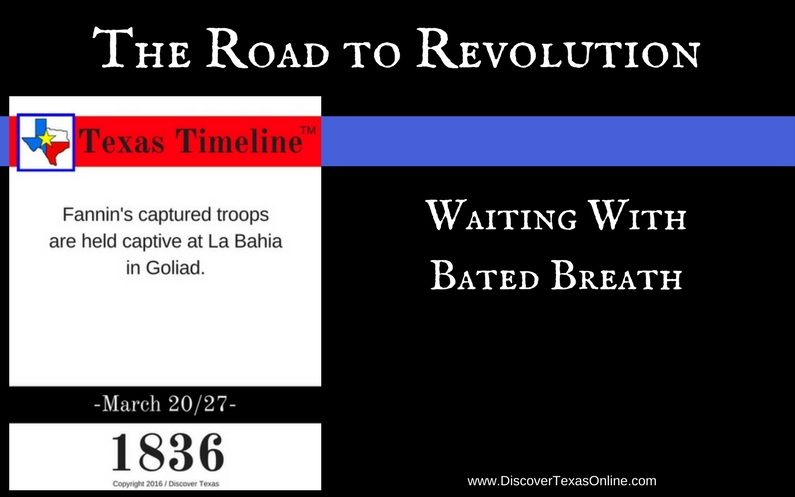 Col. James Fannin surrendered to the Mexican General Urrea on March 20, 1836 after the Battle of Coleto Creek.
Col. James Fannin surrendered to the Mexican General Urrea on March 20, 1836 after the Battle of Coleto Creek.
Fannin’s men had discussed and written down the terms of their surrender. They wished to be treated as prisoners of war in the manner of civilized nations and hoped to be paroled to the United States as soon as possible.
The problem in this was that, as Anglos requesting to be returned to the United States, Fannin’s men gave Santa Anna every reason to treat them according to the new orders he had drawn up before he left Mexico City–that all foreigners inciting rebellion on Mexican soil would be considered pirates and executed.
General Urrea was accustomed to the fact that soldiers on both sides died in a battle, but he had no stomach for executing prisoners of war. Still, he knew that if he refused Fannin’s terms outright, the bloody battle would continue, costing Mexico more lives. He could not disobey General Santa Anna, so instead he proposed that Fannin write out his terms and surrender his weapons and his men would become prisoners of war “at the disposal of the Supreme Mexican Government.” He promised to write to General Santa Anna recommending that the terms be accepted with mercy, and he expressed his confidence that Santa Anna would approve within eight days.
Fannin and his men had no other option, really. Colonel Fannin accepted General Urrea’s proposal, but he didn’t tell his men that the terms were conditional. Perhaps he did not wish to discourage them. As about 240 Texas captives were marched into La Bahia, one of the Mexican officers welcomed them almost cheerfully. “Well, gentlemen! In eight days, home and liberty!” Another 50 wounded Texans were returned to Goliad over the next two days, and 80 men from Ward’s and King’s unsuccessful rescue mission to Refugio were added to their number on March 25.
General Urrea kept his promise. He wrote to Santa Anna and requested mercy.
And so the waiting began.
Santa Anna answered General Urrea on March 23 and again on March 24, ordering him to immediately execute the “perfidious foreigners,” many of whom were actually citizens of Mexico. Apparently General Santa Anna suspected that Urrea didn’t want to kill so many men because he also wrote to Colonel Jose Nicolas de la Portila, whom Urrea had left in charge at Goliad while he continued his planned march to Victoria. On Saturday, March 26, Portilla received his direct order to execute the prisoners…but two hours later Portilla received another order–this one from General Urrea who urged him to “treat the prisoners with consideration, and especially their leader, Fannin.” Urrea suggested that Portilla use the Texas prisoners to rebuild the town…but he knew that his own order to send Mexican reinforcements to him would not leave enough soldiers to guard the prisoners at Goliad.
It is entirely possible that news spread to other Texans, who also waited to see what would happen.
Teaching Tips:
- Can it ever be right to disobey a direct order if the order is unjust?
- Help yourself to our FREE Texas Timeline Game–fun and factual!



